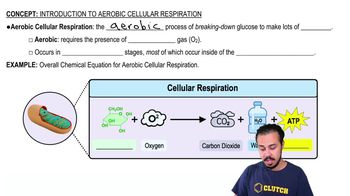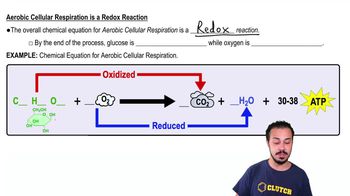Introduction to Cellular Respiration definitions Flashcards
 Back
BackIntroduction to Cellular Respiration definitions
1/15
Terms in this set (15)
- Aerobic Cellular RespirationA process that breaks down glucose in the presence of oxygen to produce ATP, carbon dioxide, and water.
- ATPThe primary energy carrier in cells, produced in large amounts during aerobic cellular respiration.
- MitochondriaOrganelles where most stages of aerobic cellular respiration occur, crucial for energy production.
- GlycolysisThe first stage of cellular respiration, occurring in the cytoplasm, where glucose is broken down.
- Pyruvate OxidationThe second stage of cellular respiration, converting pyruvate into acetyl-CoA in the mitochondria.
- Krebs CycleA series of reactions in the mitochondria that produce electron carriers for the electron transport chain.
- Electron Transport ChainA series of protein complexes in the mitochondria that generate ATP through oxidative phosphorylation.
- Redox ReactionA chemical reaction involving the transfer of electrons, crucial in cellular respiration.
- GlucoseA monosaccharide sugar that is oxidized during cellular respiration to produce ATP.
- OxygenThe final electron acceptor in the electron transport chain, reduced to form water.
- Carbon DioxideA byproduct of aerobic cellular respiration, released during the Krebs cycle.
- WaterA byproduct of aerobic cellular respiration, formed when oxygen is reduced.
- Substrate Level PhosphorylationA method of ATP production occurring in glycolysis and the Krebs cycle.
- Oxidative PhosphorylationATP production method in the electron transport chain, using energy from electron transfer.
- FermentationAn anaerobic process that allows glycolysis to continue by regenerating NAD+ in the absence of oxygen.



